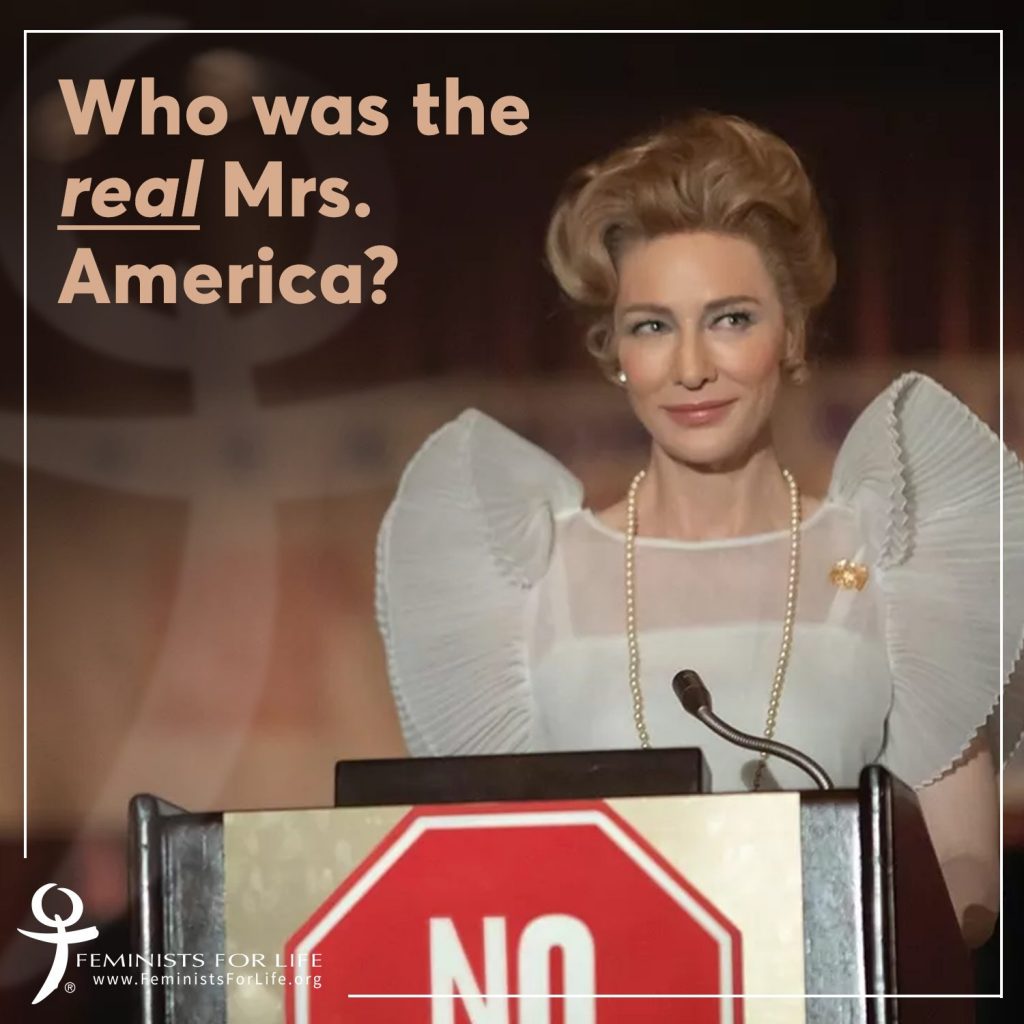
Mrs. America takes viewers on a stroll through the political journey of the Equal Rights Amendment. Particularly for those of us who didn’t experience the ’70s and early ’80s firsthand or were too young to remember it, it is a lush, nostalgic walk that manages to invite both sides of this hotbed debate to come along.
Each main character gets an episode devoted to her. This allows for some backstory and context, an important aspect since the series covers about 10 years of events across nine episodes. And while, overall, the series seems to guide viewers toward feeling like Phyllis Schlafly is the villain, and Gloria Steinem, Bella Abzug, and Betty Friedan are the heroes, thanks to some well-written subtleties in the script, there are some sprinkles of complexities that give pause.
Cate Blanchett’s portrayal of Phyllis as the crusader of the Anti-ERA movement is portrayed with delicate precision. While Phyllis was the shining star of the movement, ironically, it wasn’t her passion. Her keen eye for strategy saw that in a man’s world, she could not be the expert unless it was on women’s issues. Her desire to advise on nuclear and constitutional law was not invited, and therefore, she had to find another way to make her voice heard. She turned housewives into political powerhouses, but whether it was for their benefit or hers remains debatable. She was smart, strategic, and powerful. Perhaps even the very essence of what Steinem, Abzug, and Friedan wanted for every woman in America: but even Phyllis was not immune to the invisible rules that guided homes across America. Moments with her husband are both enviable (his privilege afforded her hers) and depressing, a point that, while true, she would never concede to the other side.
Throughout the series, supporting characters are used to remind viewers the issues of the day. Aside from the big ones of abortion and erasure of women of color from the feminist movement (shown differently from both sides: Phyllis’ cook, Gloria’s staff at Ms. magazine, and Rep. Shirley Chisolm are all left out in different ways), there was domestic violence. The fallout the supporting characters suffered was a direct effect of the decisions of the main characters. Hero or villain? That depends on whom you ask.
Of course, we as viewers know the ending. Is hindsight 2020?
I am not sure: The breadth of the divide in the feminist movement is ever-present. Certainly, some amazing gains have been achieved (the recognition of domestic violence and violence against women as one example), but the fight over the ERA, and by extension, abortion, has not been settled — most especially because it has been interpreted to support abortion-on-demand, something that we as pro-life feminists don’t believe was part of its original intent and cannot support. And of course, the original author of the ERA, Alice Paul, who helped lead the 19th amendment to victory a century ago this year, adamantly opposed efforts to connect abortion to her lifelong dream, declaring, “Abortion is the ultimate in the exploitation of women.” (Paul, who died in 1977, four years after Roe v. Wade and Doe v. Bolton were decided, is not mentioned during the entire miniseries.)
Instead, we as pro-life feminists hope to bridge the divide with a feminism that embodies nonviolence, nondiscrimination, and justice for all.
Alice, a composite character who plays a friend and longtime supporter of Phyllis, gets a glimpse of the other side at the Houston Women’s Conference. She is seemingly distraught that the stereotypes of both sides of the ERA debate aren’t true. She holds on to some beliefs and begins to question others — and in the end, she gets lost in the middle, a place that probably feels familiar to many. Except that today, a new home has emerged for so many of us: Feminists For Life.
While Mrs. America is packaged with just the right amount of style to be nostalgic but not corny, its trip down memory lane may leave you with more questions than answers. After all, who is Mrs. America?
What if she is all of us?
FFL Speaker Joyce McCauley-Benner earned her Master of Fine Arts in screenwriting from the Academy of Art University in 2013. Learn more about Joyce and her speeches, “Victory Over Violence” and “Slaves Among Us: Sex Trafficking in the U.S.,” here.






